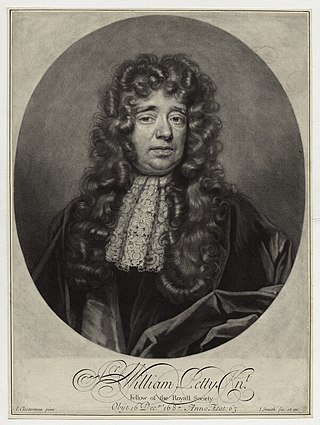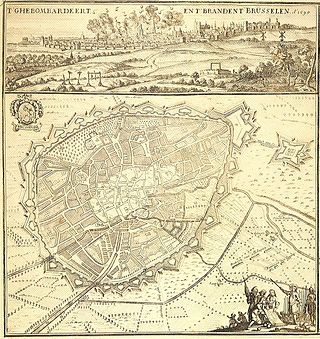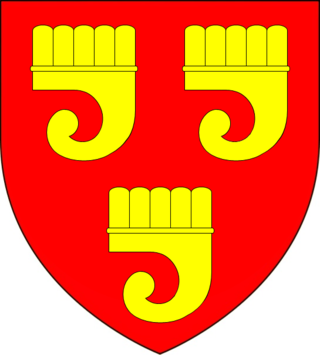This article needs additional citations for verification .(November 2010) |
Gregory King (15 December 1648 – 29 August 1712) was an English officer of arms, engraver, cartographer and statistician. [1]
This article needs additional citations for verification .(November 2010) |
Gregory King (15 December 1648 – 29 August 1712) was an English officer of arms, engraver, cartographer and statistician. [1]
Gregory King was born at Lichfield, England. His father was a surveyor and landscape gardener. Gregory was a bright boy, and his father used him as an assistant in his surveying work. At 14 Gregory became a clerk to William Dugdale, the antiquary and herald. King later (1667–69) worked for Lord Hatton, who was forming a collection of the arms of the nobility. When this project collapsed, he went to work for the dowager Lady Gerard at Sandon, Staffordshire as steward, auditor and secretary (1670–72). [2] She was the widow of Charles Gerard, 4th Baron Gerard, and remarried in 1673. [3]
In 1672 King moved to London to work as an engraver for the printer John Ogilby; he also did surveying work and engraved maps. In 1677 he was appointed Rouge Dragon Pursuivant of Arms in Ordinary in the College of Arms. He became Lancaster Herald of Arms in Ordinary in 1688 and held that post until his death in 1712. These positions in the ceremonial branch of the state were lucrative and on three occasions he was sent abroad to confer the Order of the Garter on foreign princes.
By 1695 King was started on a second official career in the business branch of the state. He was a commissioner in charge of a new tax on marriages, births and burials and later Secretary to the Commission of Public Accounts and Secretary to the Controllers of Army Accounts; in 1708 he was one of the three commissioners appointed to state the debts of the late King William.
"The first great economic statistician", as Richard Stone calls him, [4] came a generation after John Graunt and William Petty and continued their work. Their work was mainly published, but King's was not: he was a confidential advisor to the government. Material from his manuscripts appeared in the writings of his friend Charles Davenant and—a century later—in Adam Smith's Wealth of Nations (Book I, Chapter VIII), and in An Estimate of the Comparative Strength of Britain by George Chalmers. [1]
King's manuscript "Natural and Political Observations and Conclusions upon the State and Condition of England", 1696, contains estimates of the population and wealth of England at the close of the 17th century. It describes the demographic characteristics of the population of England and Wales: age, gender, marital status, numbers of children, servants and "sojourners". King also calculates the amount of beer, ale, and malt consumed annually in England. These estimates are based on intelligent inferences from data available to the state as a by-product of its taxing activities. However, in more speculative mood, King considers the present and future level of world population. His Notebook contains projections of world population: around AD 5000 or 5500 the world would be "fully peopled" with 10 times the population of 1695.
"Of the Naval Trade of England, 1688, and the National Profit then Arising thereby", written in 1697, is King's statistical summary of the trade and wealth of England, 1600–1688. He calculated the increases in shipping (for war and trade), customs, coinage, buildings, fortresses, and the purchases and improvements of land.
"Gregory King's Law", or the "King-Davenant law", is an estimate of by how much a deficiency in the supply of corn will raise the price of corn. It appears in Davenant's Essay upon the Probable Methods of making a People Gainers in the Balance of Trade. Since the early 19th century it has usually been attributed to King.
The relevant passage runs:
It is observed that but one-tenth the defect in the harvest may raise the price three-tenths, and when we have but half our crop of wheat, which now and then happens, the remainder is spun out by thrift and good management, and eked out by the use of other grain; but this will not do for above one year, and would be a small help in the succession of two or three unseasonable very destructive, in which many of the poorest sort perish, either for want of sufficient food or by unwholesome diet.
We take it that a defect in the harvest may raise the price of corn in the following proportions:
- Defect raises the price above the common rate
- 1 tenth ............... 3 tenths
- 2 tenths ............... 8 tenths
- 3 tenths ............... 16 tenths
- 4 tenths ............... 28 tenths
- 5 tenths ............... 45 tenths
So that when corn rises to treble the common rate, it may be presumed that we want above one-third of the common produce; and if we should want five-tenths or half the common produce, the price would rise to near five times the common rate. [5]
In the 19th century Whewell and Jevons re-expressed the estimate as an equation. The estimate raises several questions. To whom should it be attributed, Davenant or King? How was it constructed? How accurate is it? Stone reviews the considerable literature on these questions.
The Natural and Political Observations appear with some of King's unpublished writings in a volume edited by Peter Laslett.

The Peace of Ryswick, or Rijswijk, was a series of treaties signed in the Dutch city of Rijswijk between 20 September and 30 October 1697. They ended the 1688 to 1697 Nine Years' War between France and the Grand Alliance, which included the Dutch Republic and the Holy Roman Empire.

Sir William Petty was an English economist, physician, scientist and philosopher. He first became prominent serving Oliver Cromwell and the Commonwealth in Ireland. He developed efficient methods to survey the land that was to be confiscated and given to Cromwell's soldiers. He also remained a significant figure under King Charles II and King James II, as did many others who had served Cromwell.

John Lowther, 1st Viscount Lonsdale, PC FRS, known as Sir John Lowther, 2nd Baronet, from 1675 to 1696, was an English politician.

John Robinson was an English diplomat and prelate. He became the Bishop of London and Dean of Windsor, succeeding to Henry Compton.

Charles Davenant was an English economist, Tory politician and pamphleteer who sat in the Parliament of England representing the parliamentary constituencies of St Ives and Great Bedwyn.

William Fleetwood was an English preacher, Bishop of St Asaph and Bishop of Ely, remembered by economists and statisticians for constructing a price index in his Chronicon Preciosum of 1707.

Lisle's Tennis Court was a building off Portugal Street in Lincoln's Inn Fields in London. Originally built as a real tennis court, it was used as a playhouse during two periods, 1661–1674 and 1695–1705. During the early period, the theatre was called Lincoln's Inn Fields Playhouse, also known as The Duke's Playhouse, The New Theatre or The Opera. The building was rebuilt in 1714, and used again as a theatre for a third period, 1714–1732. The tennis court theatre was the first public playhouse in London to feature the moveable scenery that would become a standard feature of Restoration theatres.

The 1695 Siege of Namur or Second Siege of Namur took place during the Nine Years' War between 2 July and 4 September 1695. Its capture by the French in the 1692 siege and recapture by the Grand Alliance in 1695 are often viewed as the defining events of the war; the second siege is considered to be William III's most significant military success during the war.
Thomas Peter Ruffell Laslett was an English historian.

During the Nine Years' War, the French Royal Army carried out a bombardment of Brussels from August 13–15, 1695. Led by King Louis XIV and the Duke of Villeroi, French forces bombarded the city in an attempt to divert Grand Alliance troops from reinforcing the concurrent siege of Namur. The bombardment ultimately proved to be the most destructive event in the history of Brussels, destroying a third of the buildings in the city, including the Grand-Place/Grote Markt.

The Stuart period of British history lasted from 1603 to 1714 during the dynasty of the House of Stuart. The period was plagued by internal and religious strife, and a large-scale civil war which resulted in the execution of King Charles I in 1649. The Interregnum, largely under the control of Oliver Cromwell, is included here for continuity, even though the Stuarts were in exile. The Cromwell regime collapsed and Charles II had very wide support for his taking of the throne in 1660. His brother James II was overthrown in 1689 in the Glorious Revolution. He was replaced by his Protestant daughter Mary II and her Dutch husband William III. Mary's sister Anne was the last of the line. For the next half century James II and his son James Francis Edward Stuart and grandson Charles Edward Stuart claimed that they were the true Stuart kings, but they were in exile and their attempts to return with French aid were defeated. The period ended with the death of Queen Anne and the accession of King George I from the German House of Hanover.

William Nicholls (1664–1712) was an English clergyman and theologian, known as an author on the Book of Common Prayer.
John Graunt has been regarded as the founder of demography. Graunt was one of the first demographers, and perhaps the first epidemiologist, though by profession he was a haberdasher. He was bankrupted later in life by losses suffered during Great Fire of London and the discrimination he faced following his conversion to Catholicism.

Sir Bevil Granville MP JP was an English soldier and politician from Cornwall, who was MP for Fowey and Lostwithiel from 1690 to 1698. He also served as Governor of Pendennis Castle from 1693 to 1703 and Governor of Barbados from 1703 to 1706, and died at sea on his return voyage to England in September 1706.
Henry Guy was an English politician.
George Ridpath was a Scottish journalist, who wrote in the Whig interest.

The Seven Ill Years, also known as the Seven Lean Years, is the term used for a period of widespread and prolonged famine in Scotland during the 1690s, named after the biblical famine in Egypt predicted by Joseph in the Book of Genesis. Estimates suggest between 5 and 15% of the total Scottish population died of starvation, while in areas like Aberdeenshire death rates may have reached 25%. One reason the shortages of the 1690s are so well remembered is because they were the last of their kind.
John Cary (1649–1722?) was a prominent Bristol merchant and writer on matters regarding trade during the eighteenth century. Cary has been heralded as a pioneer in establishing economics as a separate field of "scientific" inquiry, a proponent of a "favorable balance of trade", and an objector to the idea that low wages were desirable.

The Economic Writings of Sir William Petty is a book with texts, written by William Petty (1623-1687), and published in 1899 by Charles Henry Hull (1864-1936), in two volumes. The Economic Writings were published together with an introduction about the life and work of William Petty, and did also contain Natural and Political Observations upon the Bills of Mortality, by John Graunt.

"Petty's Place in the History of Economic Theory" is an academic article, written by Charles Henry Hull and published in The Quarterly Journal of Economics in 1900.
For King's estimate of the country's population and wealth in 1688 see
Richard Stone's Nobel Prize lecture on the history of social accounting contains a brief account of King's work (including some tables)
For Gregory King's law see
The article on Davenant in the Palgrave Dictionary written at the end of the 19th century.
Whewell's discussion at the end of Lecture III
Jevons's discussion in the Section on the Variation of the Price of Corn in chapter IV